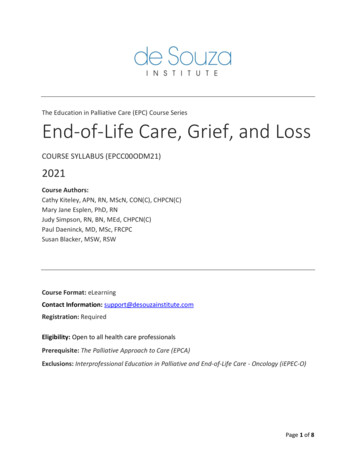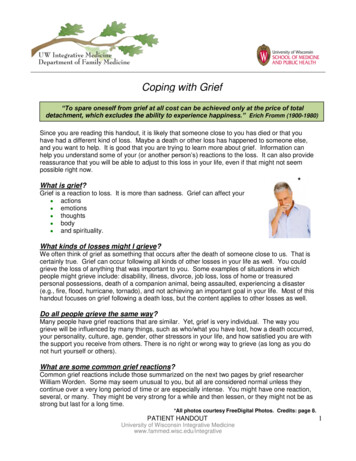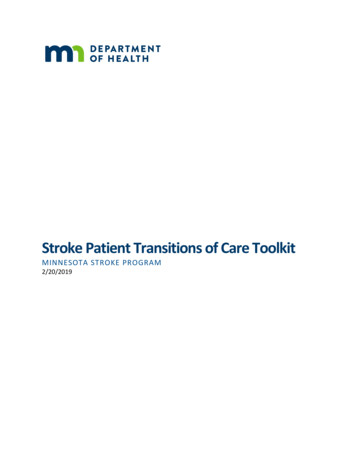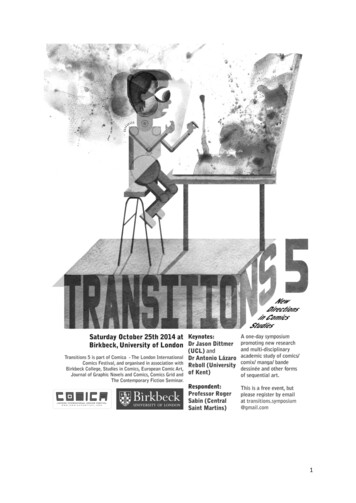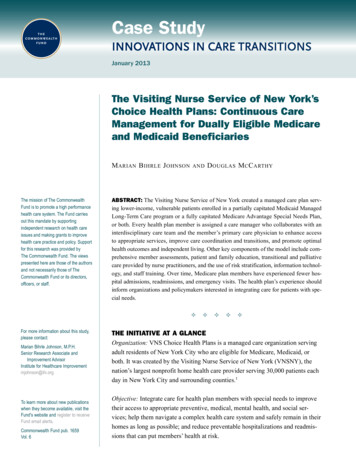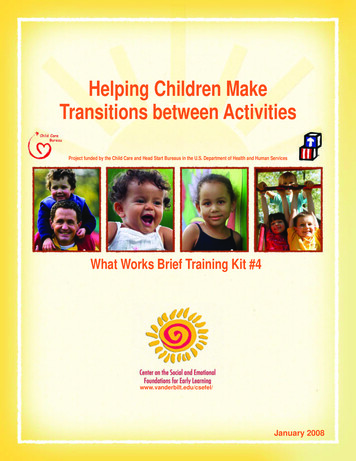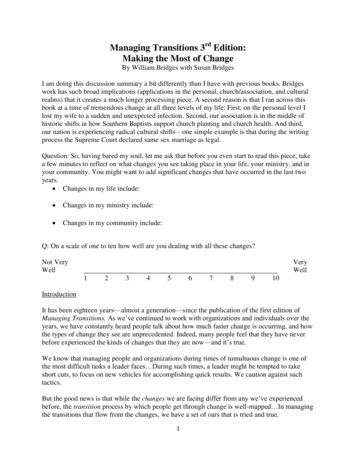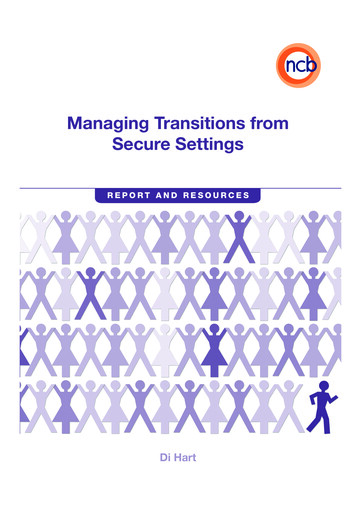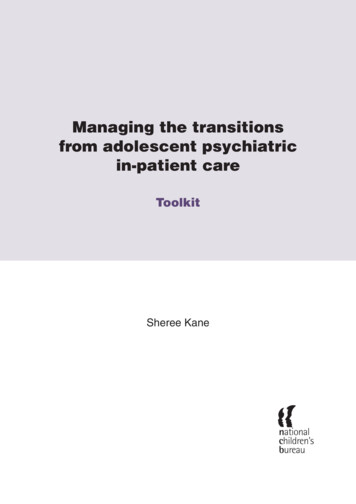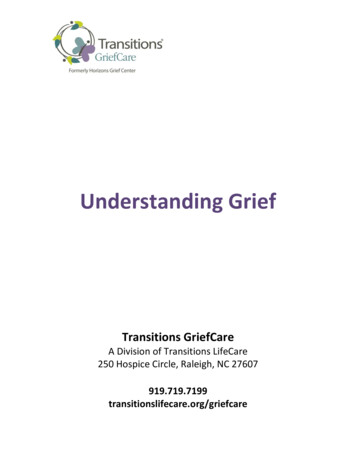
Transcription
Understanding GriefTransitions GriefCareA Division of Transitions LifeCare250 Hospice Circle, Raleigh, NC 27607919.719.7199transitionslifecare.org/griefcare
250 Hospice CircleRaleigh, NC 27607919.719.7199www.transitionslifecare.orgAlong The Journey of GriefGrief is often described as a journey. Just like the literal journeys we take in life, the grief journey can bevery unpredictable: we may know where we want to go, but we are not sure how to get there or what wemay encounter along the way. Unlike the literal journeys we take, there is no road map for the griefjourney. We want to know what is ahead, but no guide that will tell us exactly what to expect. Grief is auniquely individual experience.While no two people grieve alike, the experiences of others may help shed some light on your own griefjourney. Here is a list of some experiences that grieving people have had along the way. Some wereexpected, some were surprising. You may not encounter all of these, or may experience things that are noton this list. No matter what your journey of grief looks like, know that you are not alone.You can expect: Your grief to be surprisingly intense at times Your grief to be surprisingly draining Your grief to take longer than you – or the people around you – think it should take Your grief to affect all aspects of your life: physical, mental, emotional, social, behavioral, spiritual Unpredictable periods of “good days” and “bad days” instead of steadily feeling less pain Grief “attacks” – sudden waves of grief that occur with no warning A frustrating inability to be your normal self, feeling you are going “crazy” A wide range of feelings, not just sadness To sometimes feel nothing, or that the death isn’t real To go over and over the details leading to the death, searching for ways that you could have changed it To grieve not only for the person that you have lost, but also for your lost hopes and dreams To re-examine your beliefs and priorities as you search for meaning in your changed world A sense of changed or even lost identity, wondering “Who am I now?” A new awareness of your own mortality Resurfacing of pain from earlier losses Resurfacing of old feelings and unresolved conflicts from the past (in yourself or in your family) Changed relationships as you discover who supports you and who doesn’t Mixed feelings about memories and photos: sometimes a comfort, sometimes a too-painful reminderof what is lost Mixed feelings about “happy” events such as birthdays, holidays, weddings etc. Mixed feelings about “moving on” or being happy again Your grief to change over time: from the intense pain of all that is lost to a grateful awareness of all thatis part of you foreverCopyright 2017 Transitions LifeCare
250 Hospice CircleRaleigh, NC tanding GriefGrief: Is a natural human response to loss Is universal (we all grieve) but unique (we each grieve differently) Is an intense inner process causing many outer changes Affects us on all levels: physical, mental, emotional, behavioral, social, and spiritual Often leaves us feeling like we are ‘going crazy’ or are ‘losing it’ Is not a predictable process of required stages, but does have recognizable patterns Is a healing process, similar to physical healing from a serious injury: Recovery itself can be painful, challenging, and take longer than we expect Progress is not steady; it is normal to have both “good days” and “bad days” While we can’t control/predict the process, there are ways to help our healing We must work through the pain at times and avoid the pain at other times Caring for ourselves and respecting our current limits is vital to our healingIs different with every loss and is influenced by: Who you are at the time of the loss Who he/she is at the time of the loss How the death occurred Other life circumstances and stresses at the time of the loss History of relationship between you and the person who has died How you were taught to grieveMoves from painful sense of separation to a comforting sense of ongoing connectionWhat we have once enjoyed we can never lose.All that we love deeply is part of us forever.- Helen KellerCopyright 2017 Transitions LifeCare
250 Hospice CircleRaleigh, NC 27607919.719.7199www.transitionslifecare.orgNormal Grief ReactionsPhysicalEmotionalGrief is a natural human response to loss. It is often thought of as something that will get a little bit better eachday, a period of sadness that must be bravely endured until it lessens with time. But the truth is that grief is an“up and down” process that is much more than sadness. When someone important to us dies, it affects everyaspect of our being – physical, mental, behavioral, and spiritual as well as emotional. Grief can cause profoundchanges in all these areas, and can make you feel like something is wrong with you. But in fact, something isright with you: these reactions are normal, natural responses to the loss of a significant person in your life.SadnessAngerGuilt, regretReliefShock, numbnessYearningAnxiety, insecurity, panic, fearFatigue, feeling drainedFeeling of emptiness or “butterflies” inthe stomach Lump in the throat Tightness in the chest, breathlessness Increased muscle tension, aches, pain SpiritualBehavioralMental Confusion, disorientation, forgetfulness,inability to concentrateVivid imagery of the illness and/or deathNeed to tell the details of the loss againand againDisbelief, unrealitySleep and appetite changesIncrease in accidents or risky behaviorsSearching and calling out, talking to thedeceasedCrying, screamingRestlessness, sighingLoss of identity, loss of purposeSearch for meaning, questioningRedefining personal philosophy andassumptions about lifeTurning away from or towards existingbeliefs Apathy, lack of motivationLoneliness and sense of social isolationResentment, envy, feeling cheatedAbandonmentHelplessness, lack of controlDecreased self-confidenceHumorSusceptibility to illness or exacerbation ofexisting health problemsFeeling of weaknessPalpitationsShakingDryness of the mouthOver-sensitivity to noiseSense of presenceSeeing, smelling, or hearing the personWishing for death or to join the deceasedThoughts like: “It will never be the same”or “It’s not fair”Dreams of the deceasedIrritability, feeling “on edge”Social withdrawal or increased socialactivity; changed relationshipsChanges in work performanceIncrease or decrease in alcohol or drug useIncrease or decrease in self-careIncrease or decrease in religious practice:attending worship, prayer, meditationAnger at faith, anger at GodGratitudePeace, resolutionIncreased meaning, hopeNew life prioritiesWe all grieve, but no two people grieve alike. You may experience any combination of these reactions, and yourresponses can vary greatly from day to day. Letting yourself experience and work through them is part of thedifficult but ultimately healing process of grief.List adapted from Grief Counseling and Grief Therapy by J. William Worden and Normal Manifestations of Grief by Gerry Haynes and Kay Kukowski
250 Hospice CircleRaleigh, NC 27607919.719.7199www.transitionslifecare.orgCoping with GriefGrief can be emotionally exhausting Understand that you are different right now because you are healing Be gentle and patient with yourself; treat yourself as you would a good friend Lower your expectations of what you would normally be able to manageGive yourself a “pass” when something is too hardTake time alone when you are too tired or too sad to be with peopleSeek those you can trust to support you; avoid those who are drainingGrief can be physically exhausting Try to eat regular meals, and maintain an exercise and sleep routineTake it slowly; choose activities that replenish youAllow tears, which release stress-producing chemicals as well as emotionsConsider time off from work; look for ways to share the load at work and/or homeCreate small getaways like a hot bath, an afternoon nap, a walk outdoorsGrief can make you feel out of control Establish a routine of some kind, even if very different than before the lossPrioritize. When overwhelmed, ask: “What really needs to be done today? What can wait?”Set small goals and focus on living one day at a timeNotice what you can do: keep a “Done” list as well as a “To Do” list, and watch it growMake a list of strengths that have helped you face challenges in the pastWrite your swirling thoughts in a journal to release and bring some order to themPour your feelings out through art: paint, collage, write a poemTry brisk physical activity: work in the yard, sweep, scrub, walk fast, work outExplore relaxation practices such as breathing, meditation, yogaGrief can be confusing to those who care about you Don’t expect friends and family to be mind readers, even if they are close to youCommunicate honestly instead of being “strong”Don’t hide your tears; being open allows you to connect instead of isolateIf support is being offered, allow yourself to accept help from othersIf support is not being offered, reach out instead of waiting in silent frustrationDetermine what you need and then who can help: do you need someone to help withoverwhelming tasks or a good listener to let you talk freely? (A practical friend can help withpractical matters but may not be a good listener)Find people who “get it”: others with a similar loss, grief support groups, grief counselorsGrief is long, hard work Allow yourself to find respite in small pleasures: playing with children or pets, spending time innature, walking with a friend, watching a good movie, gardeningPay attention to the activities you are still drawn to and let yourself do themAllow yourself to experience moments of humor and happiness when they comeCopyright 2017 Transitions LifeCare
250 Hospice CircleRaleigh, NC 27607919.719.7199www.transitionslifecare.orgThe Mourner’s Bill of RightsWhen we are grieving, we are changed. It can be very hard for us to accept these changes in ourselves, andharder still for others to understand and respect the difficulty of what is happening to us. Author and griefcounselor Alan Wolfelt reminds us that we have special rights during this challenging time of healing. Knowingour rights while grieving can help us to take care of ourselves even when others do not “get it”.Here is a summary of those rights. Dr. Wolfelt’s full version and many other helpful articles can be found at hiswebsite: www.centerforloss.com /)1. YOU HAVE THE RIGHT TO EXPERIENCE YOUR OWN UNIQUE GRIEF.Your grief is YOUR grief; you do not have to accept others’ opinions about how you should be grieving.2. YOU HAVE THE RIGHT TO TALK ABOUT YOUR GRIEF.Talking aids healing; seek those who will let you talk as much as needed. You also have the right to besilent when you do not feel like talking.3. YOU HAVE THE RIGHT TO FEEL A MULTITUDE OF EMOTIONS.Grief is not just sadness. Find those who will listen to and accept your wide-ranging feelings.4. YOU HAVE THE RIGHT TO BE TOLERANT OF YOUR PHYSICAL AND EMOTIONAL LIMITS.Grief can be exhausting. Listen to what your body and mind is telling you; don’t be pushed into thingsyou aren’t ready for.5. YOU HAVE THE RIGHT TO EXPERIENCE “GRIEFBURSTS”.Grief sometimes comes from nowhere, engulfing you without warning. This is frightening, but a naturalpart of the process.6. YOU HAVE THE RIGHT TO MAKE USE OF RITUAL.Memorial rituals allow you to mourn the loss in the company of those who can support you. You get todecide what is right and meaningful for you.7. YOU HAVE THE RIGHT TO EMBRACE YOUR SPIRITUALITY.Your beliefs may be a source of comfort or a source of struggle. Allow yourself to be with those whocan support you in this.8. YOU HAVE THE RIGHT TO SEARCH FOR MEANING.You may find yourself asking “why” questions that have no easy answers. Others may offer readyanswers such as “Think of what you have to be thankful for” but you don’t have to accept them.9. YOU HAVE THE RIGHT TO TREASURE YOUR MEMORIES.Memories are a precious, lasting legacy that can be shared with those who care about you. You don’thave to ignore them.10. YOU HAVE THE RIGHT TO MOVE TOWARD YOUR GRIEF AND HEAL.Healing does not happen quickly; your life has been forever changed. Be kind to your healing self,and avoid those who cannot accept you in these changes.Adapted from “The Mourner’s Bill of Rights” by Alan D. Wolfelt, Ph.D., C.T., www.centerforloss.com
250 Hospice CircleRaleigh, NC 27607919.719.7199www.transitionslifecare.orgHow to Support Someone in GriefGrieving people often feel alone in a society that is uncomfortable with suffering, invisible in a worldwhere no one sees how their world has changed. You can help by simply and genuinely acknowledgingthe loss and the pain, and by listening without judgment or haste to make it better. You might be afraidthat speaking about it will cause pain for the grieving person, but the pain is already there -- you areactually making it possible for the pain to be released. As the proverb says, “A joy shared is doubled; agrief shared is halved.”Do’s and Don’ts of SupportDo listen attentively.Don’t be afraid of tears or strong emotion.Don’t change the subject, tell your story of loss, or offer easy answers.Do show genuine caring and acceptance of what they are saying or doing.Don’t judge, criticize, or try to talk them into feeling differently.Do validate the enormity of the loss.Don’t try to make them feel better by minimizing their pain.Don’t compare their grief to yours or anyone else’s.Do give permission to do what feels right for them at this time.Don’t give advice, unless you are asked for it.Do be patient with the changes you see and the slow pace of healing.Don’t expect the person to remain the same.Don’t push them into things that you think would be good for them.Do reach out. Offer specific practical help like childcare, groceries, yardwork, meals or cleaning.Don’t avoid the person or wait for them to reach out to you.Do reach out over the months and years, remembering them at holidays, anniversaries, etc.Don’t assume because they seem OK that they no longer need your support.Do speak about the deceased and invite the person to share memories.Don’t avoid the topic or saying the name.Copyright 2017 Transitions LifeCare
How To Support Someone In Grief: Helpful PhrasesDon’t say: I know just what you’re going throughDon’t take it so hardJust think of what you have to be grateful forS/he’s in a better placeTry to keep yourself togetherYou must get on with your lifeWe need you to be strongYou are so strongGod doesn’t put on us more than we can bearYou just need to How are you? (unless you really want to know and are ready to listen)Do say: I’ve been thinking about youI’m sorryI know this must be difficultI care about how you’re doingIt’s OK to feel this way. You don’t have to be strong right nowIt’s OK to cry. Tears are part of loving someoneIt can really hit hard sometimes; you don’t have to hold it inIt’s different for each personI’m here to listenIt sounds like s/he was very special to youIt sounds like you are really missing him right nowI’m right here. Take your timeWould you like to tell me more? Would it help to talk about it?LISTEN, LISTEN, LISTENWhen in doubt, listen. Often more effective than the “right” words, listening communicates acceptanceand genuine caring to a person in grief. Trust that listening is a gift: it allows a grieving person to heal byreleasing the pain when it occurs instead of stuffing the pain back inside where it causes continuedsuffering.Copyright 2017 Transitions LifeCare
250 Hospice CircleRaleigh, NC 27607919.719.7199www.transitionslifecare.orgAdult Grief Support ServicesTransitions GriefCare provides compassionate bereavement support to anyone in ourcommunity who is coping with the death of a family member or friend. We offer a safeplace to explore, understand, and find hope for the unique challenges of grief.Professional grief counselors provide an innovative array of counseling services, supportgroups, workshops, and community memorial events for adults and children. Programsalso include grief education, support, consultation and training for community groups,corporations, and health care professionals.Transitions GriefCare services are available to anyone in our community, regardless ofwhether the family was served by Transitions LifeCare. These services are offered at nocost although donations are gratefully accepted.Registration is required for support groups and workshops. For more information,please call 919-719-7199, or visit our website for a complete schedule of currentofferings: www.transitionslifecare.org/griefcare.Grief Counseling- Short-term individual counseling to help one understand and cope with grief- Short-term family counseling to help family members understand and acceptdifferent grieving styles and needsBereavement Support Groups- Eight week sessions to explore grief and coping with others who “get it”- Groups are offered during both daytime and evening hoursWorkshops and Special Events- Workshops to explore specific grief topics and coping skills- Creative workshops to express grief through writing, art, and yoga- Holiday Grief workshop to provide group support and ideas for coping- Services of Remembrance to find hope and healing in communityCommunity Education and Support- Education for businesses, faith communities, health and civic organizations- Grief support and consultation when death impacts a community groupLending Library and Additional Information- Books can be checked out for three week lending period- Information available on additional grief support resources in the areaCopyright 2017 Transitions LifeCare
250 Hospice CircleRaleigh, NC 27607919.719.7199www.transitionslifecare.orgBooks for AdultsGeneral GriefBozarth-Campbell, AllaLife is Goodbye, Life is HelloFitzgerald, HelenThe Mourning HandbookGrant, Adam and Sandberg, SherylOption B: Facing Adversity, Building Resilience, and Finding JoyJames, John W. & Frank CherryThe Grief Recovery HandbookKalish, RichardDeath, Grief, and Caring RelationshipsKushner, HaroldWhen Bad Things Happen to Good PeopleManning, DougDon’t Take My Grief AwayRando, Therese A.Grieving: How to Go on Living When Someone You Love DiesRich, PhilThe Healing Journey through Grief: Your Journal for Reflection and RecoverySanders, Catherine M.Surviving Grief.and Learning to Live AgainStaudacher, CarolMen & Grief: A Guide for Men Surviving the Death of a Loved OneA Time to Grieve: Meditations for Healing After the Death of a Loved OneDeath of a Life PartnerBrothers, JoyceWidowedEricsson, StephanieCompanion Through the Darkness: Inner Dialogues on GriefGinsburg, GenevieveWidow to WidowGrollman, EarlWhat Helped Me When My Loved One DiedL’Engle, MadeleineTwo-Part InventionLewis, C. S.A Grief ObservedRose, XeniaWidow’s Journey: A Return to the Loving SelfTatelbaum, JudyThe Courage to GrieveWestberg, GrangerGood GriefDeath of a ParentAkner, Lois F.Surviving the Loss of a ParentBrooks, JaneMidlife OrphanEdelman, HopeMotherless DaughtersKennedy, AlexandraLosing a ParentMyers, EdwardWhen Parents Die
250 Hospice CircleRaleigh, NC 27607919.719.7199www.transitionslifecare.orgBooks for Children(Expanded resource list available in Transitions GriefCare ‘Understanding Children’s Grief’ packet)Brown, Laurie Krasny and MarcWhen Dinosaurs Die (Grief and Loss)Cohn, JaniceI Had A Friend Named Peter (Friend Loss)dePaola, TomiNana Upstairs and Nana Downstairs (Grandparent Loss)Emswiler, James and Mary AnnGuiding Your Child Through Grief (Parent Resource)Grollman, EarlStraight Talk About Death for Teenagers: How to Cope with LosingSomeone You Love (Teen Resource)Heegaard, MargeWhen Someone Very Special Dies (Grief and Loss)Karst, PatricieThe Invisible String (Hope and Inspiration)Krementz, JillHow It Feels When a Parent Dies (Parent Loss)O’Toole, DonnaAarvy Aardvark Finds Hope (Grief and Loss)Powell, SandyGeranium Morning (Parent Loss and Accidental Death)Shriver, MariaWhat’s Heaven? (Spirituality, Heaven, and Faith)Thomas, PatI Miss You (Grief and Loss)Tiffault, BenetteA Quilt for Elizabeth (Parent Loss)The Dougy CenterAfter a Suicide: Workbook for Grieving Kids (Suicide Loss)Wilhelm, HansI’ll Always Love You (Pet Loss)
Give yourself a “pass” when something is too hard Take time alone when you are too tired or too sad to be with people Seek those you can trust to support you; avoid those who are draining Grief can be physically exhausting Try to eat
